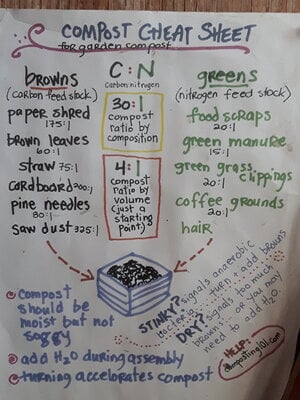AlderCreekAK
Chirping
Good afternoon chicken lover friends,
We have been wanting to start composting for a while, and now that we've got the peeps it makes perfect sense to fire it up! We've done read some research, but would super appreciate any practical advice you all might have to offer! To give you an idea, we have six clucky ladies and currently our coop + run situation have vinyl floors with sand. We live in a cold, dry climate! Some of the topics we are wondering about...

We have been wanting to start composting for a while, and now that we've got the peeps it makes perfect sense to fire it up! We've done read some research, but would super appreciate any practical advice you all might have to offer! To give you an idea, we have six clucky ladies and currently our coop + run situation have vinyl floors with sand. We live in a cold, dry climate! Some of the topics we are wondering about...
- Pile V.S. Barrel?
- Will the sand remnants be okay in the compost?
- What's a good location for the compost? Is it okay close to the coop or will it smell/bother the ladies/attract detrimental pests?
- Any general basic advice?



 Ours is in a little patch of woods semi close to the coop. I am pleased to report that it doesn’t really stink, more like an earthy smell. Ours is just a pile with 3 sides made of pallets. I turn it once or twice a week.
Ours is in a little patch of woods semi close to the coop. I am pleased to report that it doesn’t really stink, more like an earthy smell. Ours is just a pile with 3 sides made of pallets. I turn it once or twice a week.


 The key points to bokashi success are that you have to be able to seal the container and drain the liquid from the bottom. And you need to initiate fermentation. Of course, you can buy bokashi powder, but you can also make your own. It was developed in Japan.
The key points to bokashi success are that you have to be able to seal the container and drain the liquid from the bottom. And you need to initiate fermentation. Of course, you can buy bokashi powder, but you can also make your own. It was developed in Japan.  Note that the wind blows into it and the chainlink fence (which has a barrier on it) behind it. So, the wind isn't blowing over it and into the berry bushes, veggie garden or grass (of my neighbor).
Note that the wind blows into it and the chainlink fence (which has a barrier on it) behind it. So, the wind isn't blowing over it and into the berry bushes, veggie garden or grass (of my neighbor).  We weren't paying attention in the winter and neglected the barrels. Also, late last year we trimmed the hedge and removed large branches from the trees, so the compost had a lot of woody clippings that take seem to take longer to decompose. This means that even the "older compost" that should have been ready for use this spring dried out and stopped/slowed its decomposing. The "new" or "fresh" compost (from the fall) wasn't expected to be ready anyway but wasn't decomposing at all! On the flip side, for some purposes, this is great; if it is plowed into the ground, the larger chunks may help get air into the soil. But this isn't useful for all types of gardens. We had been used to dark, fine, and rich compost, and here we had this chunky stuff. We ended up ploughing and tilling the veggie area without it, and it was not good enough to add to potting soil. Ultimately, we decided to add more organic fertilizing pellets to the veggie garden this year and then add more "diversity" to the compost so that we have more decomposed compost in the fall to prep the soil for the next growing season in early 2021.
We weren't paying attention in the winter and neglected the barrels. Also, late last year we trimmed the hedge and removed large branches from the trees, so the compost had a lot of woody clippings that take seem to take longer to decompose. This means that even the "older compost" that should have been ready for use this spring dried out and stopped/slowed its decomposing. The "new" or "fresh" compost (from the fall) wasn't expected to be ready anyway but wasn't decomposing at all! On the flip side, for some purposes, this is great; if it is plowed into the ground, the larger chunks may help get air into the soil. But this isn't useful for all types of gardens. We had been used to dark, fine, and rich compost, and here we had this chunky stuff. We ended up ploughing and tilling the veggie area without it, and it was not good enough to add to potting soil. Ultimately, we decided to add more organic fertilizing pellets to the veggie garden this year and then add more "diversity" to the compost so that we have more decomposed compost in the fall to prep the soil for the next growing season in early 2021.